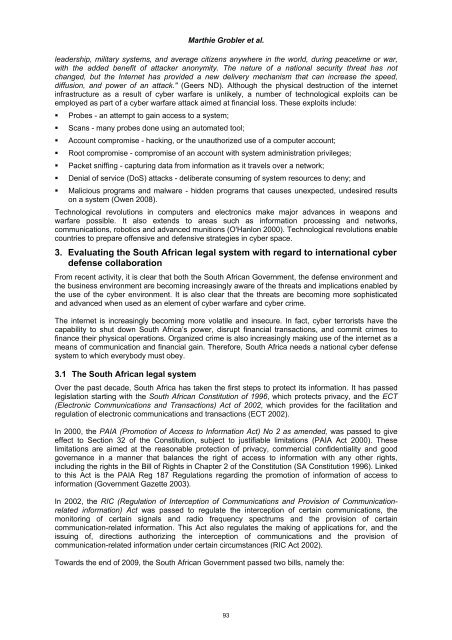6th European Conference - Academic Conferences
6th European Conference - Academic Conferences
6th European Conference - Academic Conferences
Create successful ePaper yourself
Turn your PDF publications into a flip-book with our unique Google optimized e-Paper software.
Marthie Grobler et al.<br />
leadership, military systems, and average citizens anywhere in the world, during peacetime or war,<br />
with the added benefit of attacker anonymity. The nature of a national security threat has not<br />
changed, but the Internet has provided a new delivery mechanism that can increase the speed,<br />
diffusion, and power of an attack." (Geers ND). Although the physical destruction of the internet<br />
infrastructure as a result of cyber warfare is unlikely, a number of technological exploits can be<br />
employed as part of a cyber warfare attack aimed at financial loss. These exploits include:<br />
Probes - an attempt to gain access to a system;<br />
Scans - many probes done using an automated tool;<br />
Account compromise - hacking, or the unauthorized use of a computer account;<br />
Root compromise - compromise of an account with system administration privileges;<br />
Packet sniffing - capturing data from information as it travels over a network;<br />
Denial of service (DoS) attacks - deliberate consuming of system resources to deny; and<br />
Malicious programs and malware - hidden programs that causes unexpected, undesired results<br />
on a system (Owen 2008).<br />
Technological revolutions in computers and electronics make major advances in weapons and<br />
warfare possible. It also extends to areas such as information processing and networks,<br />
communications, robotics and advanced munitions (O'Hanlon 2000). Technological revolutions enable<br />
countries to prepare offensive and defensive strategies in cyber space.<br />
3. Evaluating the South African legal system with regard to international cyber<br />
defense collaboration<br />
From recent activity, it is clear that both the South African Government, the defense environment and<br />
the business environment are becoming increasingly aware of the threats and implications enabled by<br />
the use of the cyber environment. It is also clear that the threats are becoming more sophisticated<br />
and advanced when used as an element of cyber warfare and cyber crime.<br />
The internet is increasingly becoming more volatile and insecure. In fact, cyber terrorists have the<br />
capability to shut down South Africa’s power, disrupt financial transactions, and commit crimes to<br />
finance their physical operations. Organized crime is also increasingly making use of the internet as a<br />
means of communication and financial gain. Therefore, South Africa needs a national cyber defense<br />
system to which everybody must obey.<br />
3.1 The South African legal system<br />
Over the past decade, South Africa has taken the first steps to protect its information. It has passed<br />
legislation starting with the South African Constitution of 1996, which protects privacy, and the ECT<br />
(Electronic Communications and Transactions) Act of 2002, which provides for the facilitation and<br />
regulation of electronic communications and transactions (ECT 2002).<br />
In 2000, the PAIA (Promotion of Access to Information Act) No 2 as amended, was passed to give<br />
effect to Section 32 of the Constitution, subject to justifiable limitations (PAIA Act 2000). These<br />
limitations are aimed at the reasonable protection of privacy, commercial confidentiality and good<br />
governance in a manner that balances the right of access to information with any other rights,<br />
including the rights in the Bill of Rights in Chapter 2 of the Constitution (SA Constitution 1996). Linked<br />
to this Act is the PAIA Reg 187 Regulations regarding the promotion of information of access to<br />
information (Government Gazette 2003).<br />
In 2002, the RIC (Regulation of Interception of Communications and Provision of Communicationrelated<br />
information) Act was passed to regulate the interception of certain communications, the<br />
monitoring of certain signals and radio frequency spectrums and the provision of certain<br />
communication-related information. This Act also regulates the making of applications for, and the<br />
issuing of, directions authorizing the interception of communications and the provision of<br />
communication-related information under certain circumstances (RIC Act 2002).<br />
Towards the end of 2009, the South African Government passed two bills, namely the:<br />
93

















